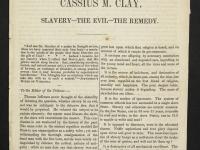Many of us know the story of the late Cassius Clay who denounced his “slave name,” converted to Islam, and became known as Muhammad Ali, the greatest boxer of all time. Yet, many do not know, that the future Muhammad Ali was named after Cassius M. Clay, an abolitionist from Kentucky, who spent his life fighting for his beliefs. One has to wonder if Muhammad Ali knew that, like him, his namesake was not one to back down from a fight even against all odds.
Similar to the Grimke sisters and John Laurens, Cassius M. Clay was a man born into a slave holding family who believed that slavery was wrong and should be abolished. He believed in using legal means to eventually abolished slavery, and wrote impassioned speeches against slavery, some of which are here at HSP. One particular source is a letter titled Slavery – the Evil – the Remedy. He uses history to explain why slavery cannot last and the effect it has taken on the country by promoting idleness in slave holders and economic decline in slave holding states. While he is not an individual to idolize, due to his often brutal and offensive behavior towards others, his predictions of a southern decline in industrialization and education due to the practice of slavery proved to be true.
When using the letter Slavery—the Evil—the Remedy, have students answer the following questions:
- Read the last paragraph on page three and the beginning of page 4, how does Cassius Clay plan to remove slavery?
- Look at the first page, second column. What is slavery doing to the south according to Clay?
- Read the last paragraph of page two and the first column on page three. What moments from history does he bring up as proof that slavery cannot exist?
- Why do you believe he chooses to quote Jefferson at the beginning of the letter?
- Have students read a brief biography of Clay along with the letter. If you were Muhammad Ali, would you want to be associated with the name Cassius Clay? Why or why not?

